翻译技巧练习题一
- 格式:doc
- 大小:40.00 KB
- 文档页数:4
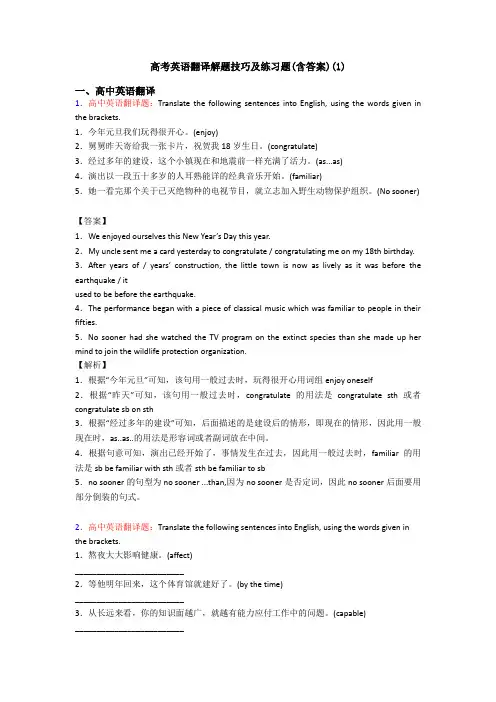
高考英语翻译解题技巧及练习题(含答案)(1)一、高中英语翻译1.高中英语翻译题:Translate the following sentences into English, using the words given in the brackets.1.今年元旦我们玩得很开心。
(enjoy)2.舅舅昨天寄给我一张卡片,祝贺我18岁生日。
(congratulate)3.经过多年的建设,这个小镇现在和地震前一样充满了活力。
(as...as)4.演出以一段五十多岁的人耳熟能详的经典音乐开始。
(familiar)5.她一看完那个关于已灭绝物种的电视节目,就立志加入野生动物保护组织。
(No sooner)【答案】1.We enjoyed ourselves this New Year’s Day this year.2.My uncle sent me a card yesterday to congratulate / congratulating me on my 18th birthday. 3.After years of / years’ construction, the lit tle town is now as lively as it was before the earthquake / itused to be before the earthquake.4.The performance began with a piece of classical music which was familiar to people in their fifties.5.No sooner had she watched the TV program on the extinct species than she made up her mind to join the wildlife protection organization.【解析】1.根据“今年元旦”可知,该句用一般过去时,玩得很开心用词组enjoy oneself2.根据“昨天”可知,该句用一般过去时,congratulate 的用法是congratulate sth或者congratulate sb on sth3.根据“经过多年的建设”可知,后面描述的是建设后的情形,即现在的情形,因此用一般现在时,as..as..的用法是形容词或者副词放在中间。
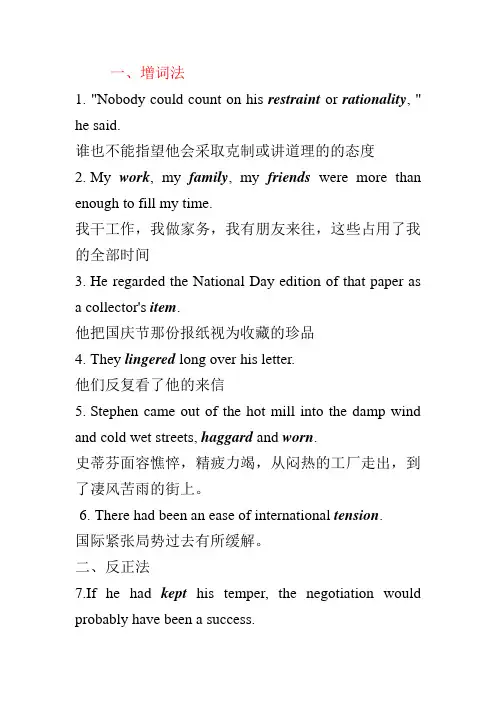
一、增词法
1. "Nobody could count on his restraint or rationality, " he said.
谁也不能指望他会采取克制或讲道理的的态度
2.My work, my family, my friends were more than enough to fill my time.
我干工作,我做家务,我有朋友来往,这些占用了我的全部时间
3.He regarded the National Day edition of that paper as
a collector's item.
他把国庆节那份报纸视为收藏的珍品
4.They lingered long over his letter.
他们反复看了他的来信
5.Stephen came out of the hot mill into the damp wind and cold wet streets, haggard and worn.
史蒂芬面容憔悴,精疲力竭,从闷热的工厂走出,到了凄风苦雨的街上。
6.There had been an ease of international tension.
国际紧张局势过去有所缓解。
二、反正法
7.If he had kept his temper, the negotiation would probably have been a success.
如果他没发脾气,这次谈判可能就成功了。
8. The two teams tied.两队不分胜负
9. His answer is beside the mark.他的回答文不对题。
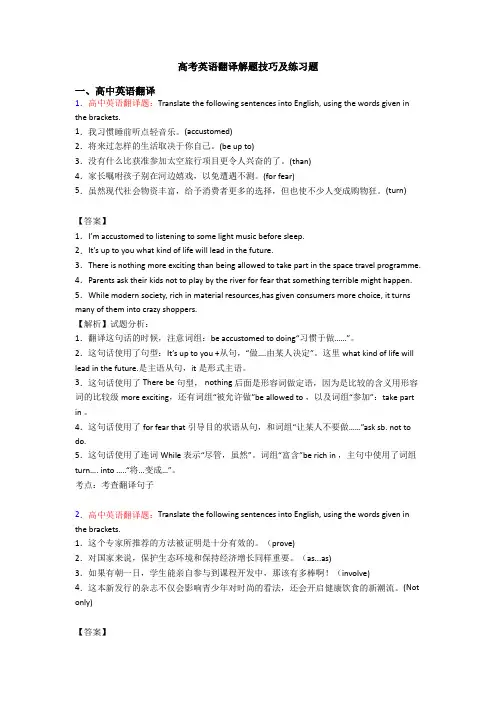
高考英语翻译解题技巧及练习题一、高中英语翻译1.高中英语翻译题:Translate the following sentences into English, using the words given in the brackets.1.我习惯睡前听点轻音乐。
(accustomed)2.将来过怎样的生活取决于你自己。
(be up to)3.没有什么比获准参加太空旅行项目更令人兴奋的了。
(than)4.家长嘱咐孩子别在河边嬉戏,以免遭遇不测。
(for fear)5.虽然现代社会物资丰富,给予消费者更多的选择,但也使不少人变成购物狂。
(turn)【答案】1.I’m accustomed to listening to some light music before sleep.2.It’s up to you what kind of life will lead in the future.3.There is nothing more exciting than being allowed to take part in the space travel programme. 4.Parents ask their kids not to play by the river for fear that something terrible might happen. 5.While modern society, rich in material resources,has given consumers more choice, it turns many of them into crazy shoppers.【解析】试题分析:1.翻译这句话的时候,注意词组:be accus tomed to doing“习惯于做……”。
2.这句话使用了句型:It’s up to you +从句,“做….由某人决定”。
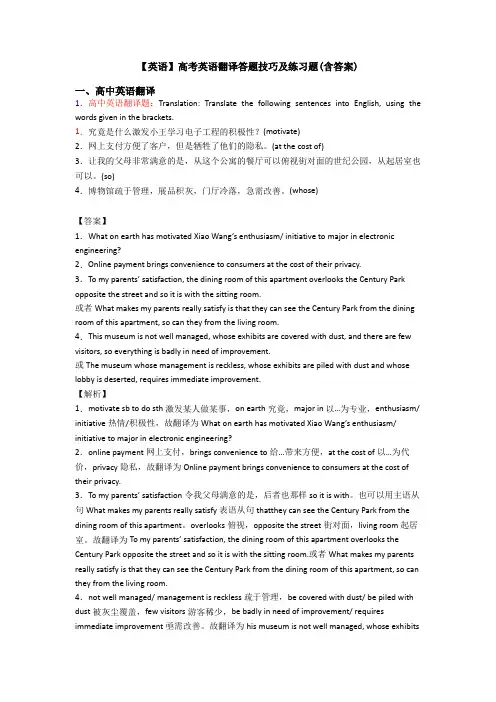
【英语】高考英语翻译答题技巧及练习题(含答案)一、高中英语翻译1.高中英语翻译题:Translation: Translate the following sentences into English, using the words given in the brackets.1.究竟是什么激发小王学习电子工程的积极性?(motivate)2.网上支付方便了客户,但是牺牲了他们的隐私。
(at the cost of)3.让我的父母非常满意的是,从这个公寓的餐厅可以俯视街对面的世纪公园,从起居室也可以。
(so)4.博物馆疏于管理,展品积灰,门厅冷落,急需改善。
(whose)【答案】1.What on earth has motivated Xiao Wang’s enthusiasm/ initiative to major in electronic engineering?2.Online payment brings convenience to consumers at the cost of their privacy.3.To my parents’ satisfactio n, the dining room of this apartment overlooks the Century Park opposite the street and so it is with the sitting room.或者What makes my parents really satisfy is that they can see the Century Park from the dining room of this apartment, so can they from the living room.4.This museum is not well managed, whose exhibits are covered with dust, and there are few visitors, so everything is badly in need of improvement.或The museum whose management is reckless, whose exhibits are piled with dust and whose lobby is deserted, requires immediate improvement.【解析】1.motivate sb to do sth 激发某人做某事,on earth究竟,major in 以…为专业,enthusiasm/ initiative热情/积极性,故翻译为What on earth has motivated Xiao Wang’s enthusiasm/ initiative to major in electronic engineering?2.online payment网上支付,brings convenience to给…带来方便,at the cost of以…为代价,privacy隐私,故翻译为Online payment brings convenience to consumers at the cost of their privacy.3.To my parents’ satisfaction令我父母满意的是,后者也那样so it is with。
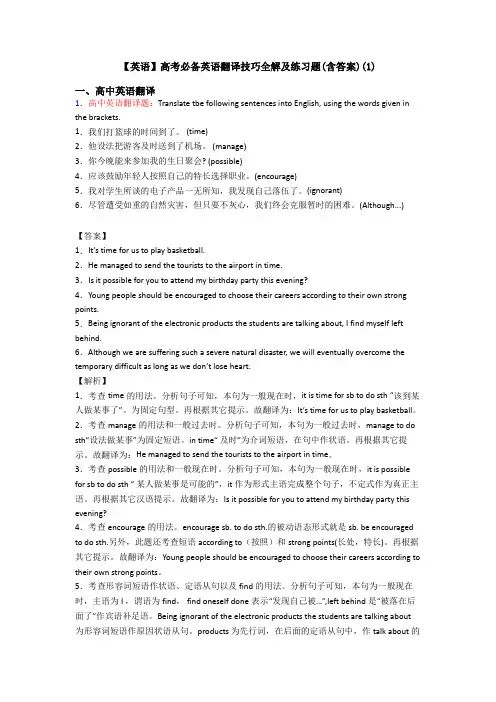
【英语】高考必备英语翻译技巧全解及练习题(含答案)(1)一、高中英语翻译1.高中英语翻译题:Translate tbe following sentences into English, using the words given in the brackets.1.我们打篮球的时间到了。
(time)2.他设法把游客及时送到了机场。
(manage)3.你今晚能来参加我的生日聚会? (possible)4.应该鼓励年轻人按照自己的特长选择职业。
(encourage)5.我对学生所谈的电子产品一无所知,我发现自己落伍了。
(ignorant)6.尽管遭受如重的自然灾害,但只要不灰心,我们终会克服暂时的困难。
(Although...)【答案】1.It’s time for us to play basketball.2.He managed to send the tourists to the airport in time.3.Is it possible for you to attend my birthday party this evening?4.Young people should be encouraged to choose their careers according to their own strong points.5.Being ignorant of the electronic products the students are talking about, I find myself left behind.6.Although we are suffering such a severe natural disaster, we will eventually overcome the temporary difficult as long as we don’t lose heart.【解析】1.考查time的用法。

高考英语高中英语翻译解题技巧及练习题(1)一、高中英语翻译1.高中英语翻译题:Translate the following sentences into English, using the words given in the brackets.1.今年元旦我们玩得很开心。
(enjoy)2.舅舅昨天寄给我一张卡片,祝贺我18岁生日。
(congratulate)3.经过多年的建设,这个小镇现在和地震前一样充满了活力。
(as...as)4.演出以一段五十多岁的人耳熟能详的经典音乐开始。
(familiar)5.她一看完那个关于已灭绝物种的电视节目,就立志加入野生动物保护组织。
(No sooner)【答案】1.We enjoyed ourselves this New Year’s Day this year.2.My uncle sent me a card yesterday to congratulate / congratulating me on my 18th birthday. 3.After years of / years’ construction, the litt le town is now as lively as it was before the earthquake / itused to be before the earthquake.4.The performance began with a piece of classical music which was familiar to people in their fifties.5.No sooner had she watched the TV program on the extinct species than she made up her mind to join the wildlife protection organization.【解析】1.根据“今年元旦”可知,该句用一般过去时,玩得很开心用词组enjoy oneself2.根据“昨天”可知,该句用一般过去时,congratulate 的用法是congratulate sth或者congratulate sb on sth3.根据“经过多年的建设”可知,后面描述的是建设后的情形,即现在的情形,因此用一般现在时,as..as..的用法是形容词或者副词放在中间。
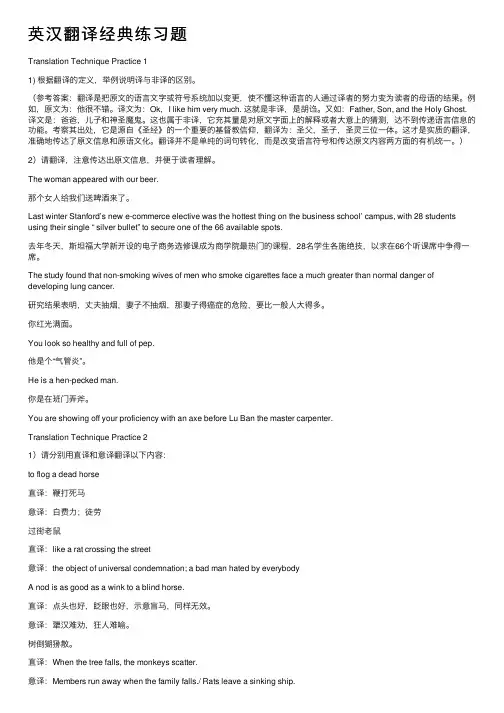
英汉翻译经典练习题Translation Technique Practice 11) 根据翻译的定义,举例说明译与⾮译的区别。
(参考答案:翻译是把原⽂的语⾔⽂字或符号系统加以变更,使不懂这种语⾔的⼈通过译者的努⼒变为读者的母语的结果。
例如,原⽂为:他很不错。
译⽂为:Ok,I like him very much. 这就是⾮译,是胡诌。
⼜如:Father, Son, and the Holy Ghost.译⽂是:爸爸,⼉⼦和神圣魔⿁。
这也属于⾮译,它充其量是对原⽂字⾯上的解释或者⼤意上的猜测,达不到传递语⾔信息的功能。
考察其出处,它是源⾃《圣经》的⼀个重要的基督教信仰,翻译为:圣⽗,圣⼦,圣灵三位⼀体。
这才是实质的翻译,准确地传达了原⽂信息和原语⽂化。
翻译并不是单纯的词句转化,⽽是改变语⾔符号和传达原⽂内容两⽅⾯的有机统⼀。
)2)请翻译,注意传达出原⽂信息,并便于读者理解。
The woman appeared with our beer.那个⼥⼈给我们送啤酒来了。
Last winter Stanford’s new e-commerce elective was the hottest thing on the business school’ campus, with 28 students using their single “ silver bullet” to secure one of the 66 available spots.去年冬天,斯坦福⼤学新开设的电⼦商务选修课成为商学院最热门的课程,28名学⽣各施绝技,以求在66个听课席中争得⼀席。
The study found that non-smoking wives of men who smoke cigarettes face a much greater than normal danger of developing lung cancer.研究结果表明,丈夫抽烟,妻⼦不抽烟,那妻⼦得癌症的危险,要⽐⼀般⼈⼤得多。
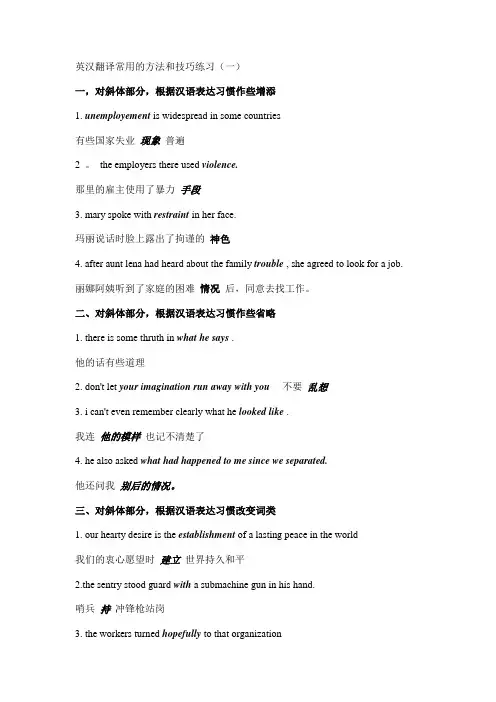
英汉翻译常用的方法和技巧练习(一)一,对斜体部分,根据汉语表达习惯作些增添1. unemployement is widespread in some countries有些国家失业现象普遍2 。
the employers there used violence.那里的雇主使用了暴力手段3. mary spoke with restraint in her face.玛丽说话时脸上露出了拘谨的神色4. after aunt lena had heard about the family trouble , she agreed to look for a job. 丽娜阿姨听到了家庭的困难情况后,同意去找工作。
二、对斜体部分,根据汉语表达习惯作些省略1. there is some thruth in what he says .他的话有些道理2. don't let your imagination run away with you 不要乱想3. i can't even remember clearly what he looked like .我连他的模样也记不清楚了4. he also asked what had happened to me since we separated.他还问我别后的情况。
三、对斜体部分,根据汉语表达习惯改变词类1. our hearty desire is the establishment of a lasting peace in the world我们的衷心愿望时建立世界持久和平2.the sentry stood guard with a submachine gun in his hand.哨兵持冲锋枪站岗3. the workers turned hopefully to that organization工人对那个信组织抱着很大希望4. the war was immediately caused by incursions across the borders那次战争的直接原因时侵入国境四、对斜体部分,要求从反面表达,但不改变原义1. he tried to catch one of the rafts with a boat-hook,but missed.他想用一根船钩去钩一个木筏,但没有钩着2. they had better keep their promise because everything hinges on that right now. 他们最好不要失信,因为目前一切都要以此为转移3. these are days when nerves are worn thin.这些日子精神上有些受不了4. all night long the beating and questioning goes on , the search goes on.拷打、审讯彻夜不停,搜捕彻夜不停五、对斜体部分,根据汉语表达习惯改变语态1. i have been sent here by the norwegian shipping company t o talk with you about transportation.我是挪威轮船公司派来和贵方商谈运输问题的2. everything he advertised was guaranteed to last "forever"他保证他广告中所登的东西都能“永久”使用3. my fist thirty years were spent in western america.我的前三十年时在美国西部度过的4. an individual is judged by how he serves the collective, but the collective is expected to cherish the lives and talents of its individuals.判断一个人要看他对集体服务得怎样,但是集体也要忠实个人得生活和才能一、翻译句子,注意right 在句中的词类来确定它的词义1. it is not right for children to sit up late 孩子们睡得晚不好adj2. the plane was right above out heads 飞机正好在我们头上面adv3. in the negative, right and left, and black and white are reversed 照片底片上,左右黑白与正片恰好相反n4. she tried her best to right her husband from the charge of robbery 她尽力为她丈夫被控抢劫伸冤v二、翻译句子,注意根据上下文及搭配关系来确定斜体词的词义account for1. he is ill; that accounts for his absence. 他病了,这就是他缺席的原因2. In this battle he accounted for five of the enemy 他在这场战斗中消灭了五个敌人3. i want you to account for every cent you spent 我要你把花费的每分钱都交代清楚make up1. if the stove isnt't made up, it will go out 如不添煤,炉子就会熄灭2. there isn't any girl called Clementine. he's just made her up 根本没有个叫。
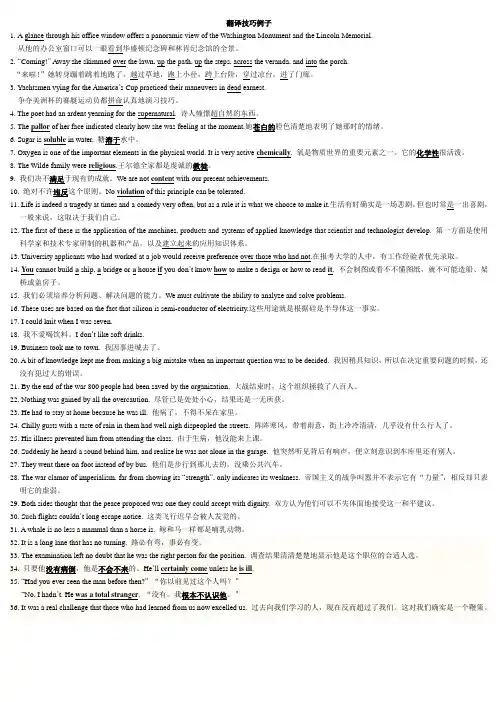
翻译技巧例子1.A glance through his office window offers a panoramic view of the Washington Monument and the Lincoln Memorial.从他的办公室窗口可以一眼看到华盛顿纪念碑和林肯纪念馆的全景。
2.“Coming!” Away she skimmed over the lawn, up the path, up the steps, across the veranda, and into the porch.“来啦!”她转身蹦着跳着地跑了,越过草地,跑上小径,跨上台阶,穿过凉台,进了门廊。
3.Yachtsmen vying for the America’s Cup practiced their maneuvers in dead earnest.争夺美洲杯的赛艇运动员都拼命认真地演习技巧。
4. The poet had an ardent yearning for the supernatural. 诗人憧憬超自然的东西。
5. The pallor of her face indicated clearly how she was feeling at the moment.她苍白的脸色清楚地表明了她那时的情绪。
6. Sugar is soluble in water. 糖溶于水中。
7. Oxygen is one of the important elements in the physical world. It is very active chemically. 氧是物质世界的重要元素之一。
它的化学性很活泼。
8. The Wilde family were religious.王尔德全家都是虔诚的教徒。
9. 我们决不满足于现有的成就。
We are not conten t with our present achievements.10. 绝对不许违反这个原则。
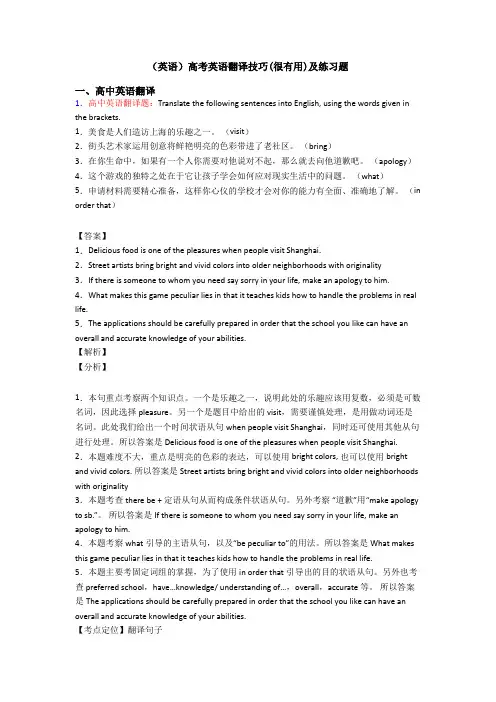
(英语)高考英语翻译技巧(很有用)及练习题一、高中英语翻译1.高中英语翻译题:Translate the following sentences into English, using the words given in the brackets.1.美食是人们造访上海的乐趣之一。
(visit)2.街头艺术家运用创意将鲜艳明亮的色彩带进了老社区。
(bring)3.在你生命中,如果有一个人你需要对他说对不起,那么就去向他道歉吧。
(apology)4.这个游戏的独特之处在于它让孩子学会如何应对现实生活中的问题。
(what)5.申请材料需要精心准备,这样你心仪的学校才会对你的能力有全面、准确地了解。
(in order that)【答案】1.Delicious food is one of the pleasures when people visit Shanghai.2.Street artists bring bright and vivid colors into older neighborhoods with originality3.If there is someone to whom you need say sorry in your life, make an apology to him. 4.What makes this game peculiar lies in that it teaches kids how to handle the problems in real life.5.The applications should be carefully prepared in order that the school you like can have an overall and accurate knowledge of your abilities.【解析】【分析】1.本句重点考察两个知识点。
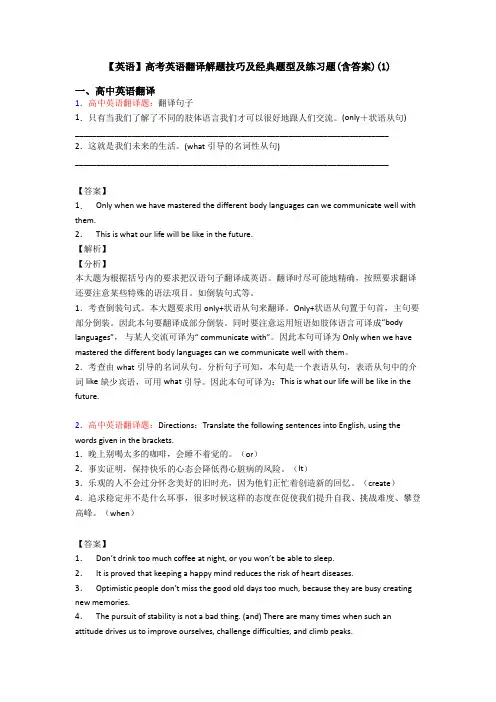
【英语】高考英语翻译解题技巧及经典题型及练习题(含答案)(1)一、高中英语翻译1.高中英语翻译题:翻译句子1.只有当我们了解了不同的肢体语言我们才可以很好地跟人们交流。
(only+状语从句)________________________________________________________________________2.这就是我们未来的生活。
(what引导的名词性从句)________________________________________________________________________【答案】1. Only when we have mastered the different body languages can we communicate well with them.2. This is what our life will be like in the future.【解析】【分析】本大题为根据括号内的要求把汉语句子翻译成英语。
翻译时尽可能地精确,按照要求翻译还要注意某些特殊的语法项目。
如倒装句式等。
1.考查倒装句式。
本大题要求用only+状语从句来翻译。
Only+状语从句置于句首,主句要部分倒装。
因此本句要翻译成部分倒装。
同时要注意运用短语如肢体语言可译成“body languages”,与某人交流可译为“ communicate with”。
因此本句可译为Only when we have mastered the different body languages can we communicate well with them。
2.考查由what引导的名词从句。
分析句子可知,本句是一个表语从句,表语从句中的介词like缺少宾语,可用what引导。
因此本句可译为:This is what our life will be like in the future.2.高中英语翻译题:Directions:Translate the following sentences into English, using the words given in the brackets.1.晚上别喝太多的咖啡,会睡不着觉的。
增词法1.They are sanguine about building up a near peace.2.After all preparations were made, the plane took off.3. From the evaporation of water, people know that liquids can turn into gases under certain condition.4. He felt the patriot rise within his breast.5. She was small and slight in person, pale, sand-haired.6.These early cars were slow, clumsy, and inefficient.7. Wash before meal.8. Like most wildlife, deer reproduce, grow, and store fat in the summer and fall when there is plenty of nutritious food available.9. It was said that his father was a fisherman. Maybe he was as poor as we are.10. Matter can be changed into energy, and energy into matter.11. We won’t retreat; we never have and never will.12. Some had beautiful eyes, others a beautiful nose, others a beautiful mouth and figure; few, if any, had all.13. The strongest man cannot alter the law of nature.14. But when she was there beside the sea, absolutely alone, she cast the unpleasant, pricking garments from her, and for the first time in her life she stood naked in the open air, at the mercy of the sun, the breeze that beat upon her, and the waves that invites her.15. Don’t take it seriously. It’s only a joke.16. He deserves not the sweet that will not taste the sour.17. It was a bright September afternoon and the streets of New York were brilliant with moving men.18. Every family is said to have at least one skeleton in the cupboard.19. The blond boy quickly crossed himself.20.1.他们对建立一种准和平局面非常乐观。
Unit 1翻译技巧(一)翻译概述1.把下面的英语段落翻译成汉语。
没有哪个政治体制是完美的;但是很多美国人都会告诉你,如果他们会嫉妒我们的一样东西的话,那就是我们英国传统的为期三周的大选,因为它的简洁就是一种仁慈----是对选民和政治家们双方的仁慈:他们拿它跟美国四年一度的总统选举中进行的那些耗时几个月的战争相比。
2. 把下面的汉语段落翻译成英语。
Someone has once prophesied that once cigarettes disappear from the surface of the earth, the whole world may be in chaos. This might be an exaggeration, but the danger of smoking should not be underestimated. Smoking is a curse affecting the whole globe. Let’s put foreign countries aside. China alone has hundreds of millions of smokers. Addicted smokers often say that it would be more difficult for them to endure the suffering of two hours without smoking a cigarette than a day without having meals. Smoking pollutes the air and endangers the health, consequently increasing the incidence of lung cancer greatly.Unit 2翻译技巧(二)直译与意译1. 用直译法翻译下列的词语、惯用语和句子:(1)开胃酒(2)水果蛋糕(3)童装(4)人工语言(5)门铃(6)访问学者(7)走下坡路(8)扣帽子/加标签于某人(9)随大流(10)overtime pay (11)peanut oil (12)rice flour (13)academic journal(14)woman editor (15)evening paper (16)tear up by the roots (17)get in by the backdoor (18)paper tiger(19) 必须注意到,电流是与每次电阻减小成比例地增加的。
高中英语翻译(一)解题方法和技巧及练习题一、高中英语翻译1.高中英语翻译题:Translate the following sentences into English, using the words given in the brackets.1.我习惯睡前听点轻音乐。
(accustomed)2.将来过怎样的生活取决于你自己。
(be up to)3.没有什么比获准参加太空旅行项目更令人兴奋的了。
(than)4.家长嘱咐孩子别在河边嬉戏,以免遭遇不测。
(for fear)5.虽然现代社会物资丰富,给予消费者更多的选择,但也使不少人变成购物狂。
(turn)【答案】1.I’m accustomed to listening to some light music before sleep.2.It’s up to you what kind of life will lead in the future.3.There is nothing more exciting than being allowed to take part in the space travel programme. 4.Parents ask their kids not to play by the river for fear that something terrible might happen. 5.While modern society, rich in material resources,has given consumers more choice, it turns many of them into crazy shoppers.【解析】试题分析:1.翻译这句话的时候,注意词组:be accustomed to doing“习惯于做……”。
2.这句话使用了句型:It’s up to you +从句,“做….由某人决定”。
【英语】高考英语翻译技巧阅读训练策略及练习题(含答案)(1)一、高中英语翻译1.高中英语翻译题:Translate the following sentences into English, using the words given in the brackets.1.美食是人们造访上海的乐趣之一。
(visit)2.街头艺术家运用创意将鲜艳明亮的色彩带进了老社区。
(bring)3.在你生命中,如果有一个人你需要对他说对不起,那么就去向他道歉吧。
(apology)4.这个游戏的独特之处在于它让孩子学会如何应对现实生活中的问题。
(what)5.申请材料需要精心准备,这样你心仪的学校才会对你的能力有全面、准确地了解。
(in order that)【答案】1.Delicious food is one of the pleasures when people visit Shanghai.2.Street artists bring bright and vivid colors into older neighborhoods with originality3.If there is someone to whom you need say sorry in your life, make an apology to him. 4.What makes this game peculiar lies in that it teaches kids how to handle the problems in real life.5.The applications should be carefully prepared in order that the school you like can have an overall and accurate knowledge of your abilities.【解析】【分析】1.本句重点考察两个知识点。
英汉翻译技巧练习I一、词的翻译:3. 文化词语的翻译1. 要坚持“菜蓝子”市长负责制,“米袋子”省长负责制。
It is necessary to persist in the system of the city mayor’s responsibility for the “market basket” and that of the provincial governor’s responsibility for the “rice bag”.2. 火灾事故发生后,厂里所有与事故有干系的工人都推诿扯皮,说错在别人不关自己的事儿。
After the accidental fire in the factory, all the workers involved kept passing the buck, saying it was someone else’s fault not theirs.3. 实行“八七扶贫”攻坚计划。
To carry out the plan to assist 80 million people in having sufficient food and clothing within seven years.4. 这幢乡村小学教学楼建了7年还未完工,是个典型的“半拉子”工程。
Although it was started 7 years ago, the teaching building in this country school remains unfinished, a typical never-to-be finished project.5. 拿到安家费,你就可以如愿给新家买台电脑了。
Now that you have the settling-inallowance in hand, you can buy for your new home the computer you’ve always wanted to have.6. 企业吃国家“大锅饭”,员工吃企业“大锅饭”。
翻译技巧练习(一)一.请翻译下列句子,并说出所使用的翻译技巧。
1.After 1992, there has been serious unemployment in some Western countries.2.He has many hot potatoes to handle everyday.3.我不敢班门弄斧,诚望您发表高见。
4.Reading makes a full man; conference a ready man; writing an exact man.5.Many people can bear adversity, but few contempt.6.There are friends and friends.7.In the fairy tales, all too often it was the same one: the prince meets the princess;they fall in love; marry each other and live happily together.8.这架电视机真是价廉物美。
9.中国足球的落后状态必须改变。
10.小红不喜欢小王,小王也不喜欢小红,两人永远也好不起来。
11.He is a man of culture and learning.12.千真万确。
13.你怎么能过河拆桥,忘恩负义呢?14.One after another, speakers called for the downfall of imperialism, abolition ofexploitation of man by man, liberation of the oppressed of the world.15.他有口才,有风度,但是不诚实。
16.低速度就等于停步,甚至等于后退。
要抓住机会,现在就是好机会。
(《邓小平文选》)17.今天下午忙吗?如果不忙的话,我希望你跟我们在一起。
18.1) It’s always something that you are the owner of so many wonderful books.2) He has strong desire to be somebody.3) Everybody who was anybody in Labour politics turned up.4) There must be something in it.5) She is my horse, my dog, my anything, ” the male chauvinist husband said.6) They are nameless nothings.7) I am a mere nobody.二.请将下列划线部分翻译为汉语。
.Since the 1960s, a lot of houses have been built in suburbs, far from the centers of large cities. While more and more people are working in and around big cities, most prefer not to live in city conditions. As the suburbs grow, the city centers tend to become mainly places for business. Once an American has reached his home he is interested in working to improve it—making things, mending things, and working on the car—to make it as pleasant as possible. There is a strong desire to spend much free time at home when the home is well-equipped, comfortable and attractive; even the private swimming pool is no longer reserved for the very rich.But Americans are a restless people who are always ready to move. So, although they enjoy the life in the suburbs, they will by no means end their pursuit there. When his income rises as his career makes progress, he soon looks for a better house, in a better district, with more land, a better view, a bigger and finner swimming pool. He may be attached to the house which is home for the time being but does not mean that he will put his roots there. Today’s job, today’s income, today’s friends and neighborhoods: all these are part of an American’s (and his family’s) identity. Instant coffee, instant friends—but nothing is seen as permanent; an American hopes and expects to change them all for something better; and he finds no difficulty in identifying himself with the new.1.1992年后,一些西方国家失业现象严重。
2.他每天要处理许多棘手的问题。
3.I dare not show off in the presence of an expert. I hope you would be kindenough to enlighten us on this matter.4.读书使人充实,讨论使人机智,写作使人准确。
5.很多人能够忍受逆境,但很少人能忍受被人轻视。
6.朋友有多种。
有益友,有损友。
7.在童话故事里,总是老一套:王子和公主始而相遇,继而相爱,最后结婚并幸福的生活在一起。
8.This television set is really cheap (in price) and fine (in quality).9.The ( state of / condition of ) backwardness of the Chinese football must bechanged.10.Xiao Hong dislikes Xiao Wang and vice versa. They can never be on goodterms.11.他是个很有学问的人。
12.Really and truly?13.How can you kick down the ladder?14.发言人相继表示要打倒帝国主义,消灭人剥削人的制度,解放全世界被压迫的人15.He is eloquent and elegant but not honest.16.Slow growth equals stagnation and even retrogression. We must graspopportunities;the present offers an excellent one.17.Are you busy this afternoon? If not, I wish you would stay with me for awhile.18. 1) 想想你拥有这么多好书,你就会感到自慰.2) 他极想出人头地。
3) 工党政治生活中的头面人物个个都到场.4) 这里面必有名堂.5) “她是我的马,我的狗,反正是属于我的东西,”那个大男子主义的丈夫说。
6) 他们是无名小卒7) 我是一个微不足道的人.20. 西安交通大学2002年考研真题,考试科目:基础英语Directions:please translate the following passage into Chinese, and write your Chinese version on the Answer Sheet.Youth is not a time of life; it is a state of mind. It is not a matter of rosy cheeks, red lips and supple knees. It is a matter of the will, a quality of the imagination, vigor of the emotions; it is the freshness of the deep spring of life. Youth means a temperamental predominance of courage over timidity, of the appetite for adventure over the love of ease. This often exits in a man of 60, more than a boy of 20. Nobody grows merely by the number of years; we grow old by deserting our ideas. Years may wrinkle the skin, but to give up enthusiasm wrinkles the soul. Worry, fear, self-distrust1 bows the heart and turns the spirit back to dust. Whether 60 or 16, there i s in every human being’s heart the lure of wonders, the unfailing childlike appetite of what’s next and the joy of the game of living. In the center of your heart and my heart there is a wireless station; so long as it receives messages of beauty, hope, cheer, courage and power from men and from infinite, so long as you are young.。